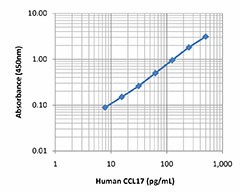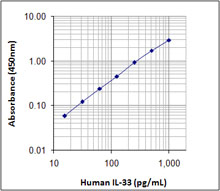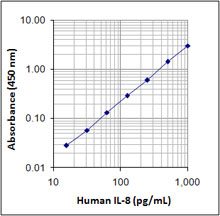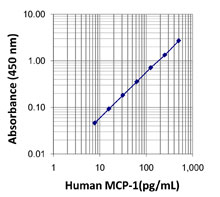- Regulatory Status
- RUO
- Other Names
- Human CCL17 (TARC) Precoated ELISA Kit, Thymus and activation-regulated chemokine (TARC), Small-inducible cytokine 17 (SCYA17), ABCD-2
- Ave. Rating
- Submit a Review
- Product Citations
- publications

Human CCL17, also known as thymus and activation regulated chemokine (TARC), was initially isolated from phytohemagglutinin-stimulated peripheral blood mononuclear cells. CCL17 is constitutively expressed in the thymus and under activation in several cell types. CCL17-mediated recruitment of Th2 cells and CLA+ CD4+ T cells plays a key role in allergic diseases such as atopic dermatitis, allergic asthma, allergic rhinitis, and allergic contact dermatitis. In addition, CCL17 has been detected in idiopathic pulmonary fibrosis. CCL17 and CCL22 secreted by dendritic cells (DCs) seems to mediate the recruitment of regulatory T cells to sites of inflammation in patients with chronic hepatitis. CCL17 is upregulated under several conditions: TNF-a, IL-4, and IFN-? in bronchial epithelial cells; TGF-ß1, TNF-a, and IFN-? in human keratinocyte cell lines; and histamine and prostaglandin E2P in immature DCs.
BioLegend's LEGEND MAX™ Human CCL17 (TARC) ELISA Kit is a Sandwich Enzyme-Linked Immunosorbent Assay (ELISA) with a 96-well strip plate that is pre-coated with an antibody specific for human CCL17. This kit is specifically designed for the accurate quantitation of human CCL17 from cell culture supernatant, serum, plasma, and other biological fluids. This kit is analytically validated with ready-to-use reagents.
Kit Details
- Kit Contents
-
- Anti-Human CCL17 (TARC) Pre-coated 96-well Strip Microplate
- Human CCL17 (TARC) Dectection Antibody
- Human CCL17 (TARC) Standard
- Avidin-HRP D
- Assay Buffer A
- Wash Buffer (20X)
- Substrate Solution F
- Stop Solution
- Plate Sealers
- Materials Not Included
-
- Microplate reader able to measure absorbance at 450 nm
- Adjustable pipettes to measure volumes ranging from 1 µL to 1,000 µL
- Deionized water
- Wash bottle or automated microplate washer
- Log-Log graph paper or software for data analysis
- Tubes to prepare standard dilutions
- Timer
- Plate Shaker
- Polypropylene vials
Product Details
- Verified Reactivity
- Human
- Application
-
ELISA
- Sensitivity
- 0.9 ± 0.12 pg/mL
- Standard Range
- 7.8-500 pg/mL
- Materials Not Included
-
- Microplate reader able to measure absorbance at 450 nm
- Adjustable pipettes to measure volumes ranging from 1 µL to 1,000 µL
- Deionized water
- Wash bottle or automated microplate washer
- Log-Log graph paper or software for data analysis
- Tubes to prepare standard dilutions
- Timer
- Plate Shaker
- Polypropylene vials
Antigen Details
- Cell Sources
- PBMCs, monocytes, dendritic cells, bronchial epithelial cells, smooth muscle cells, keratinocytes, and fibroblasts
- Biology Area
- Cell Biology, Signal Transduction
- Molecular Family
- Cytokines/Chemokines
- Gene ID
- 6361 View all products for this Gene ID
- UniProt
- View information about CCL17 on UniProt.org
Related Pages & Pathways
Pages
Related FAQs
- In your LEGEND MAX™ ELISA Kits, there is a step that calls for washing the plates before adding sample. What is the purpose of this step?
-
We typically use a stabilizer for pre-coated plates. The additional washing step is designed to remove these components before you start the assay. If you do not perform the washing, the effect on assay performance is negligible.
- I have multiple LEGEND MAX™ ELISA kits that I want to run simultaneously. Can I use the same wash buffer for all the kits?
-
The wash buffer provided in all our LEGEND MAX™ kits is the same and the part numbers on the wash buffer bottles in these kits should be identical. For ELISA MAX™ Deluxe and ELISA MAX™ Standard Sets, we provide a recipe for the wash buffer on each kit’s technical data sheet. This recipe is the same for all ELISA MAX™ sets.
- For some of your ELISA kits, why do my serum samples require dilution with assay buffer?
-
In some cases, dilution with assay buffer is required to minimize the matrix difference between the samples and the standards to achieve better accuracy.













Follow Us